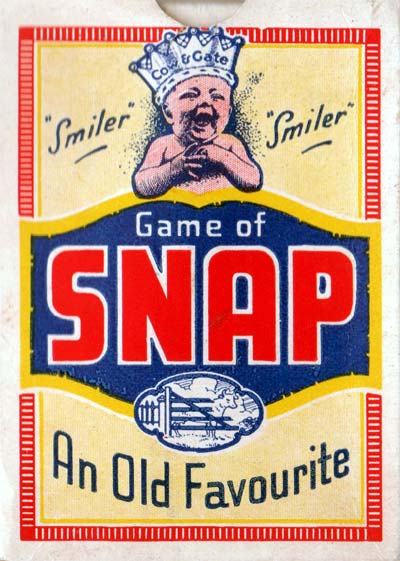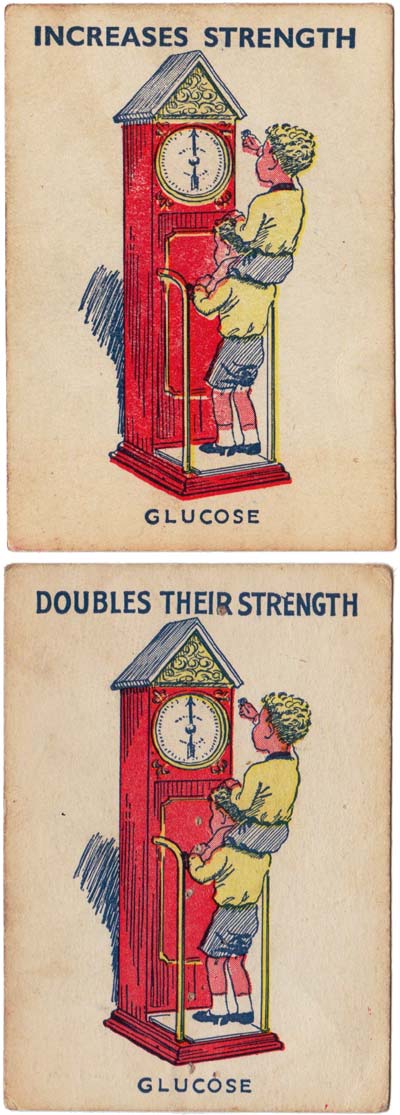Cow & Gate ‘Snap’
Cow & Gate ‘Snap’ featuring Cow & Gate Baby Milk Food, 1935.
Cow & Gate ‘Snap’, first edition featuring Cow & Gate Milk Food and the baby quadruplets Ann, Ernest, Paul and Michael, born in 1935. See the Rules►
See also: Cow & Gate Happy Family Game which had been published in 1928, before the Snap game.



Above: Cow & Gate ‘Snap’ first edition with the baby quadruplets Ann, Ernest, Paul and Michael, born in 1935.
The Miles Quads Ann, Ernest, Paul and Michael were born in 1935. At the time they were the first UK quads to survive more than a few days. I haven’t been able to find out if any of them were still alive today. They would be 85 by now.
They were a news sensation at the time and were sponsored by several companies who wanted to use their popularity for publicity. One of these companies was Cow and Gate. The Gates family opened a shop in 1771 in Guildford. In 1881 the descendants of the family decided to go into the Dairy business and opened creameries selling the product in little brown jugs with a cow looking through a gate printed on them. By 1903 they had opened a drying plant to produce dried milk and within a few years they were placing adverts in the newspapers to widen their customer base. The powdered milk sold well in the UK and America and the Cow and Gate baby “Smiler” wearing a crown was adopted as a trade mark. In 1935 when the Miles quads were born Cow and Gate were quick to offer their milk for them to drink because they had developed a milk called “Frailac” especially for premature babies and this was ideal for the Miles family. Cow and Gate continued their research and development of baby milk and today they belong to the Danone Group and continue to market baby products.
The Cow and Gate Happy Family game was issued in 1928, before the Snap games, so no Miles family appears in it. The Snap cards were published in two editions. The first came out very soon after the quads were born and the second 2 or 3 years later when they had grown up a bit.
Second Edition
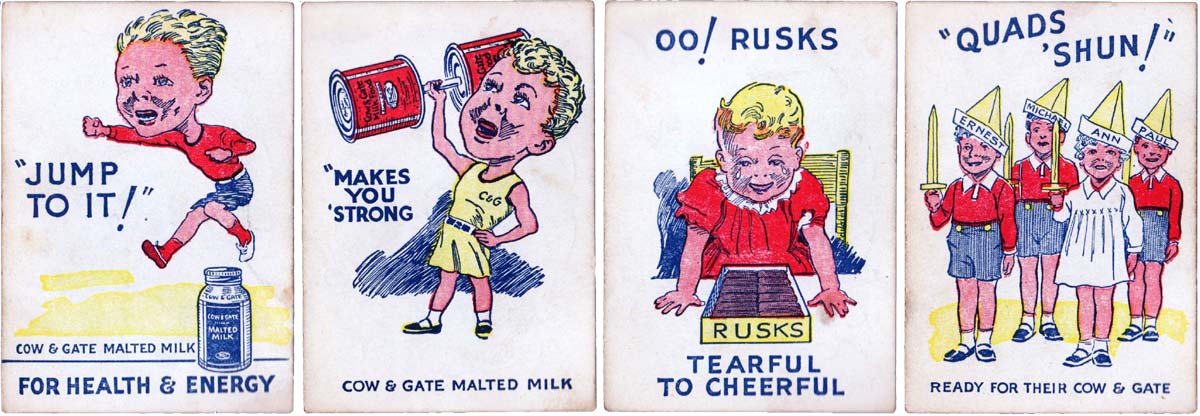

Above: Cow & Gate ‘Snap’ second edition, c.1938. The box, back and rules are the same as the first edition.
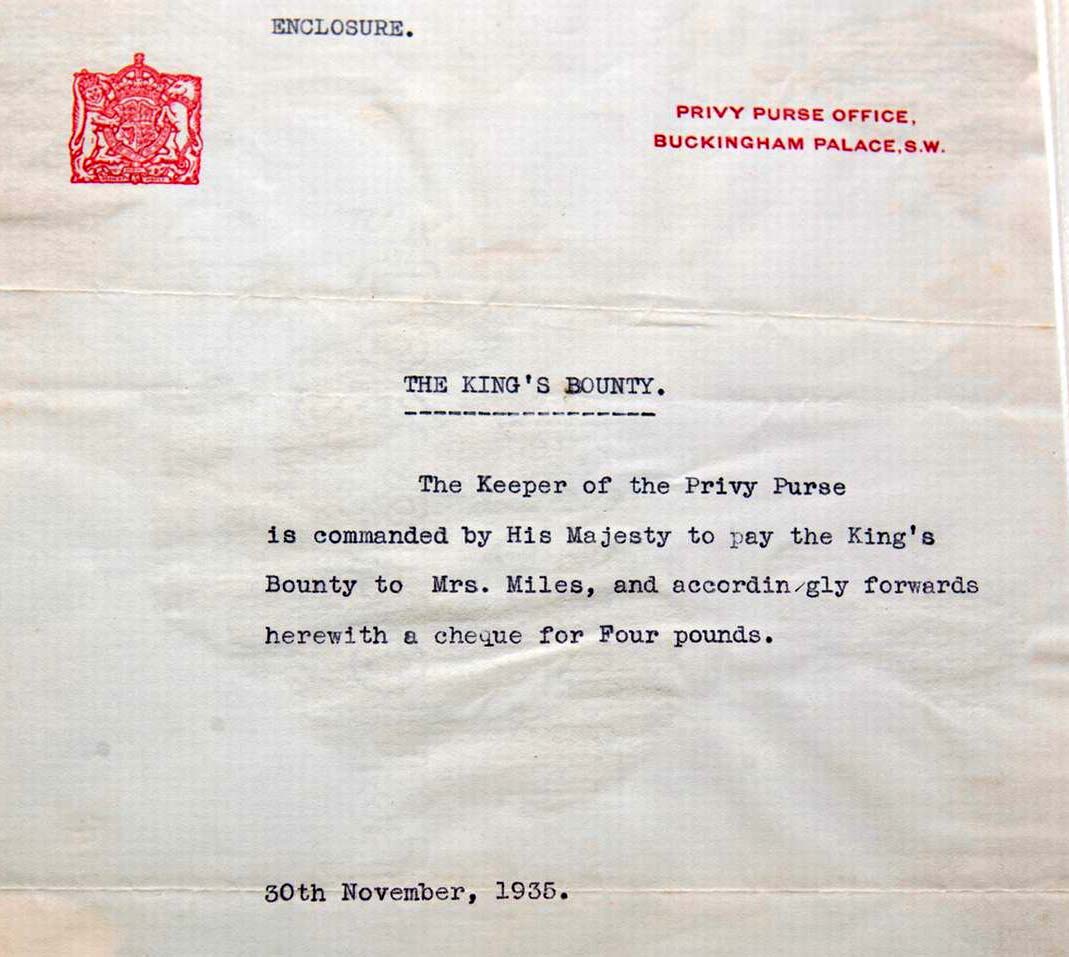

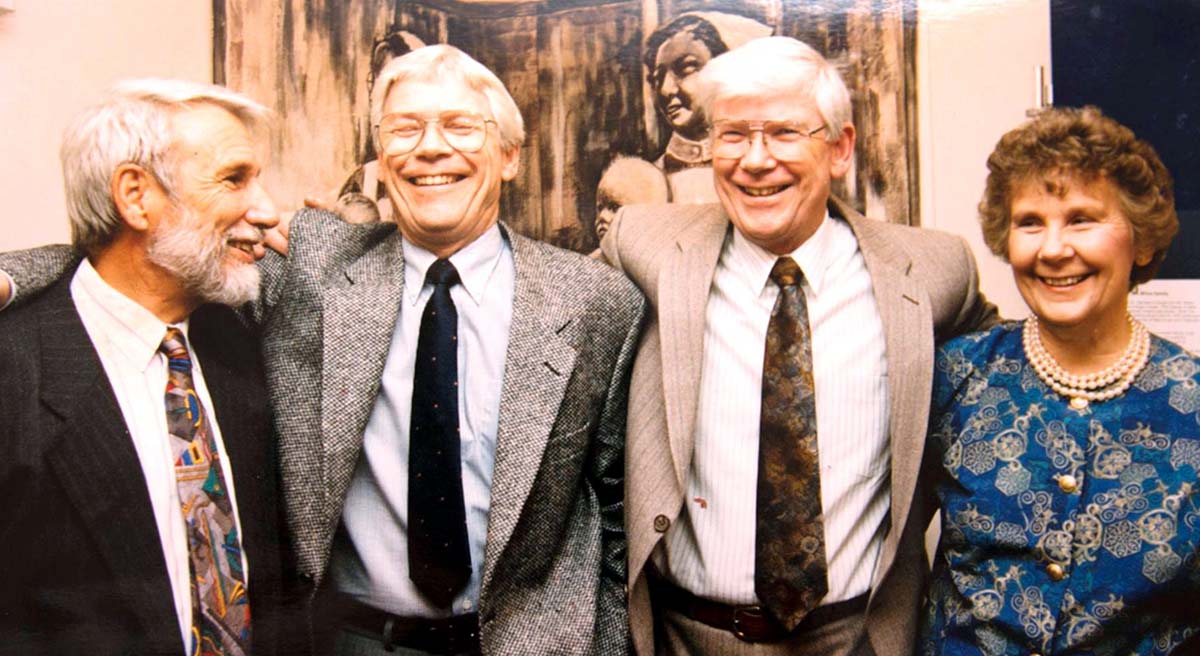

By Rex Pitts (1940-2021)
Member since January 30, 2009
Rex's main interest was in card games, because, he said, they were cheap and easy to get hold of in his early days of collecting. He is well known for his extensive knowledge of Pepys games and his book is on the bookshelves of many.
His other interest was non-standard playing cards. He also had collections of sheet music, music CDs, models of London buses, London Transport timetables and maps and other objects that intrigued him.
Rex had a chequered career at school. He was expelled twice, on one occasion for smoking! Despite this he trained as a radio engineer and worked for the BBC in the World Service.
Later he moved into sales and worked for a firm that made all kinds of packaging, a job he enjoyed until his retirement. He became an expert on boxes and would always investigate those that held his cards. He could always recognize a box made for Pepys, which were the same as those of Alf Cooke’s Universal Playing Card Company, who printed the card games. This interest changed into an ability to make and mend boxes, which he did with great dexterity. He loved this kind of handicraft work.
His dexterity of hand and eye soon led to his making card games of his own design. He spent hours and hours carefully cutting them out and colouring them by hand.
Related Articles

ViVa Bourg
A distinctive deck of cards for a specific promotion.

Dancing
“Dancing” playing cards manufactured by Nintendo for Torii Dance School, Osaka.

Scientific Whist
“Scientific Whist” : standard cards with instructions for play on the faces by Chas Goodall & Son, 1...

Agent Provocateur
Branded lingerie collection in a pack of pin-up playing cards.

Shin-Tōmei Expressway Opening Commemoration
Promotional playing cards for the Shin-Tōmei Expressway, a major Japanese expressway that opened in ...

Nimbus playing cards
Mike Steer’s weather-themed pack with suits in four colours and backs for cardistry.

Agatha Christie and Playing Cards revisited
Agatha Christie uses card-play as a primary focus of a story, and as a way of creating plots and mot...

The Decadent Deck
Studies in the eroticism of the female body by Inge Clayton.

Historic Shakespeare
“Historic Shakespeare” playing cards featuring Shakespearean characters by Chas Goodall & Son.

Copechat Paramount Sorting System
Preserving the past: a specimen deck showcasing edge-notched cards and their ingenious sorting syste...

Heartsette by Herbert Fitch & Co, 1893
A glimpse into a busy print and design office in late Victorian London.

Intersigma
A Czech advertising deck for a company dealing with pump technology.

Rap Rummy
Rap Rummy made by Parker Brothers in 1926, only 4 years after the discovery of King Tutankhamen’s to...

Batman® playing cards
Batman playing cards published by InterCol of London 1989.

Can You Believe Your Eyes?
“Can You Believe Your Eyes?” playing cards featuring visual illusions & other oddities.

Pastime Playing Cards for the Blind
The “Pastime” Playing Cards for the Blind manufactured by Goodall & Son Limd., c.1910.
Most Popular
Our top articles from the past 28 days


